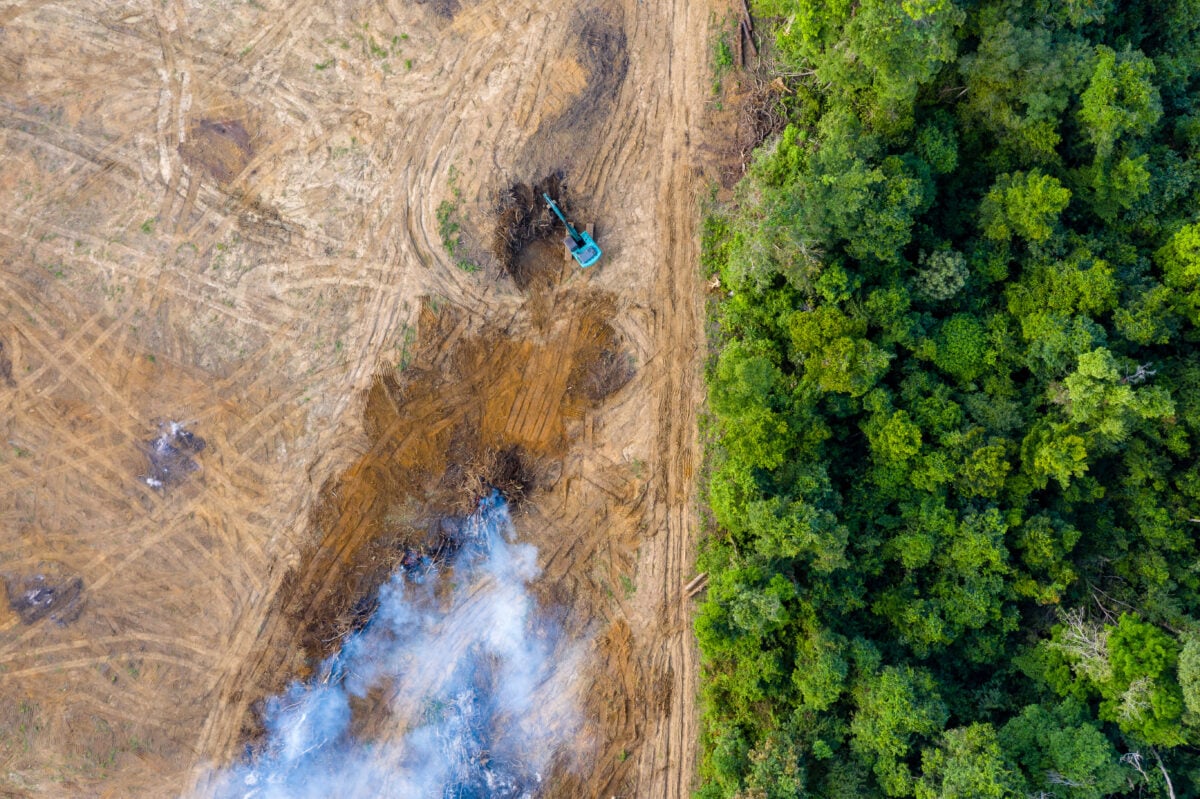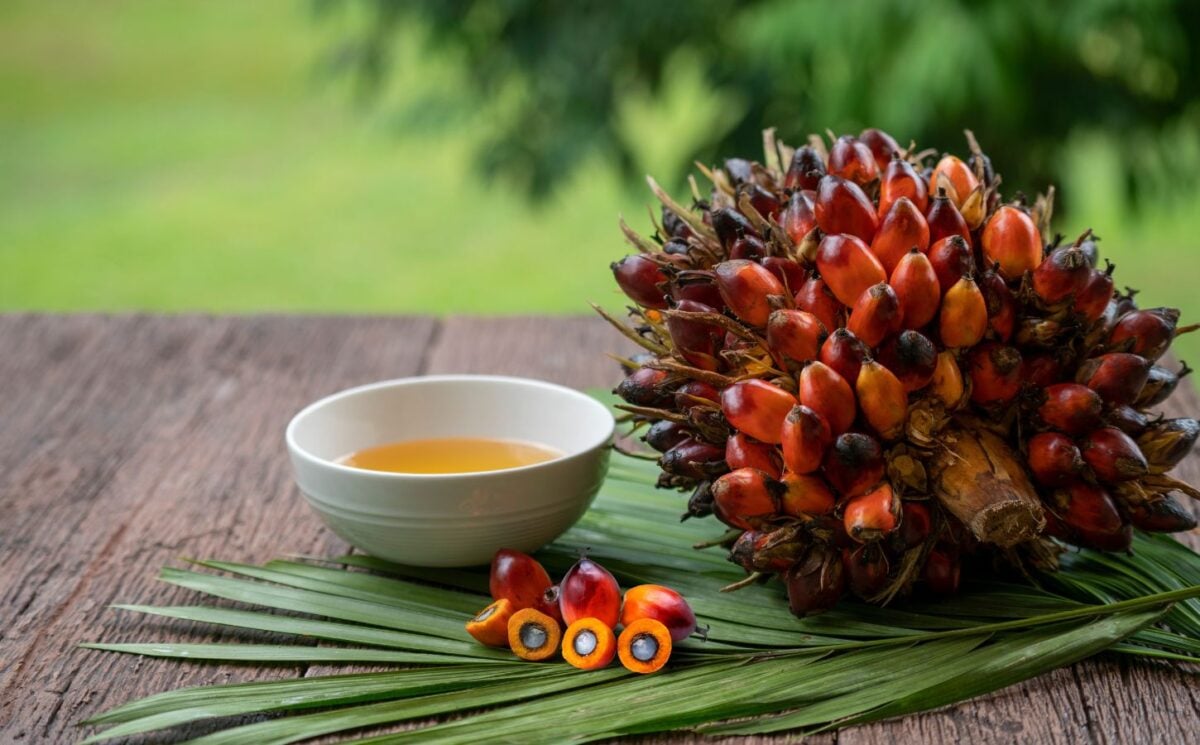Palm oil is everywhere. It’s cheap, tasty, and extremely versatile. However, the growing global demand for palm oil and its continued mass production negatively impacts humans, animals, and the environment. With this in mind, is palm oil vegan? Here’s what you need to know.
Read more: Deforestation Could Turn The Amazon Rainforest Into A Permanent Source Of Carbon
What is palm oil?
Palm oil is an edible, vegetable-based oil derived from the Elaeis, or “oil palm.”
Humans have likely been harvesting palm oil for up to 5,000 years for dietary and culinary purposes. For much of that time, palm oil was used almost exclusively by people living in the central and western African countries where the Elaeis are native flora.
In the 1800s, colonizers from Europe recognized the ingredient’s versatility and potential and began exporting both palm oil and the palms themselves. (Learn more about the sector’s historical links to colonization and the Atlantic slave trade from Reuters here.)
Exported palm trees were planted ornamentally or used to establish plantations in other tropical areas, including Southeast Asia, where much of the global supply is grown today.
Indonesia alone now produces 57 percent of all palm oil, closely followed by Malaysia with 26 percent. Together, the two countries produce around 64 million tons per year, while the palm oil industry overall accounts for about 35 percent of the world’s vegetable oil.
How is palm oil used?
Palm oil is an efficient ingredient with myriad uses and applications, which is a key factor in its still-growing global popularity. It is frequently used at an industrial level in inks and resins, in agricultural feed (enabling factory farming), and in the creation of biofuels.
Palm oil remains a culturally and economically significant ingredient throughout West Africa, where the tree originates. In Nigeria, for example, it features in staple dishes such as fried palm oil stews and jollof rice, while also forming a key part of the national economy.
While high in saturated fats, palm oil has also been linked to some positive health outcomes such as protected brain function and improved vitamin A status. Globally, you can find palm oil in nearly 50 percent of packaged products, including items as disparate as cookies, makeup, and soap. On average, people consume around 8 kg of palm oil per year.
Palm oil’s popularity as an ingredient makes it extremely difficult to avoid, though many people do try to cut down or minimize their consumption. Compared to other ethically or environmentally dubious ingredients, consumer awareness is actually relatively high.
Around 77 percent of the UK population is aware of palm oil, with 41 percent of those aware of palm oil perceiving it as “environmentally unfriendly.” However, many people remain unaware of the precise reasons palm oil harms the environment.
Read more: Wildlife Populations Have Plunged 73% In 50 Years
Why is palm oil ‘bad?’

Palm oil is not inherently good or bad, and it’s important to remember that the ingredient has a rich culinary history outside of the current huge international demand. However, when produced and consumed at this current enormous rate, palm oil’s footprint can be significant.
Here’s how modern palm oil production negatively impacts the planet.
Palm oil causes deforestation
The creation of palm oil plantations in tropical regions has a direct, negative impact on ecologically important woodland and rainforests. Planting palm oil plantations in these areas typically means removing trees and displacing wildlife, ie deforestation.
On the island of Borneo, which once was almost entirely covered by forest, only about 50 percent of the tree cover remains. This affects the natural ecosystem, those who live there – particularly Indigenous people – and the entire planet, by worsening the climate crisis.
Slash-and-burn land clearing, which is particularly damaging, is commonplace throughout Southeast Asia, further affecting the region’s soil, water, and air quality. In 2019, 857,000 hectares of land were burned in Indonesia, according to Greenpeace.
Palm oil contributes to the climate crisis
Deforestation significantly reduces the carbon-sequestering qualities of forested areas, particularly when the land is then turned into homogenous palm plantations. Tropical deforestation accounts for about 10 percent of annual global warming by releasing carbon dioxide and other greenhouse gasses (GHGs) stored by trees, foliage, and soil.
Large sections of tropical rainforest thrive in swampy peatland, which also stores enormous quantities of carbon. Functioning peatland can store up to 30 times more carbon per hectare than the rainforest itself, making the combination invaluable to climate mitigation.
The loss of peat swamp forests in Indonesia and Malaysia alone is thought to be causing nearly one percent of annual GHGs. (While one percent might not sound like a lot, that’s nearly half of the entire aviation industry’s yearly planet-heating emissions.)
Palm oil contributes to biodiversity loss
Palm oil-caused deforestation has a huge impact on the countless other flora and fauna that previously lived within the rainforest ecosystem. The IUCN has said that palm oil production is a threat to at least 193 endangered or vulnerable species.
Tropical countries are incredibly biodiverse, and Indonesia alone is home to up to 15 percent of all known mammals, birds, and plants. Notable examples include the orangutan, pygmy elephant, and Sumatran rhino, all of which have been driven to the brink of extinction.
Data suggests that only 23 percent of vertebrate species found in rainforests can survive on a palm oil plantation, and that the diversity of surviving vertebrate species is just 38 percent of that found in natural forests. This destruction inevitably impacts the broader ecosystem, causing more biodiversity loss, further irreversible damage, and so on.
In addition to the dangers of habitat destruction and poaching, keystone species such as elephants are sometimes shot to protect palm oil plantations from their passage.
Palm oil production has been linked to human rights violations
Singaporean company Wilmar is the world’s largest processor of palm oil and made USD $67 billion in 2023. According to Amnesty International, workers on plantations run by Wilmar and its suppliers struggle to earn enough to live, with some making as little as USD $2.50 per day.
Workers keep long hours with inadequate PPE, resulting in injuries. Amnesty International also notes that some plantations have children as young as eight doing “hazardous, hard physical work,” sometimes leaving school and helping their families work to make ends meet.
Many Indigenous peoples living in target areas for palm oil plantations have lost their traditional forests, homes, and livelihoods to the industry. Juliana Nnoko-Mewanu, researcher on women and land at Human Rights Watch, has described how Indonesia’s Indigenous communities have “suffered significant harm” after being disrupted or displaced.
Brazil’s Acará and Tomé-Açu people have experienced escalating conflicts over land, including torture and physical abuse. Global Witness summarizes some of the intimidation and violence experienced by Amazonian Brazil’s Indigenous and traditional communities here.
Is palm oil vegan?

To be suitable for vegans, a food must not contain any animal products or animal-derived ingredients. This means that, technically, palm oil is vegan-friendly.
That said, due to the fact that its production has a huge impact on animals, leading to the suffering and death of wildlife, many vegans choose not to eat palm oil. There’s no easy answer to whether vegans should eat palm oil, and ultimately whether you feel comfortable consuming it or not is a deeply personal choice.
Palm oil is frequently the key plant-based ingredient in snacks, sweets, treats, drinks, cosmetics, and other products that previously would have contained animal fat. It can be found in vegan and “accidentally vegan” products alike, including popular vegan staples like Biscoff cookies and spreads.
Brands like Biscoff say that they use oil sourced from Roundtable on Sustainable Palm Oil (RSPO) certified “sustainable” plantations, meaning it should be produced ethically. However, some studies indicate that even so-called sustainable palm oil is typically produced on deforestation-ravaged land. Greenpeace has referred to sustainable palm oil as “a con.”
While veganism may appear to apply to non-human animals only, many people extend it to include human rights and all of the interconnected ethical, social, and environmental justice issues of the modern world. However, eschewing everything unethical is all but impossible. So, in practical terms, being vegan today simply means doing as much as is possible or practical.
What can be done about palm oil production?
Simply replacing our global reliance on palm oil could potentially result in even more destructive practices. For example, because of its unparalleled yield efficiency, swapping palm oil for an alternative like rapeseed or soy would require more than twice as much land.
Other oils also come with unique problems, such as rapeseed’s comparatively high demand for water, or soy’s already prominent role in deforestation via animal farming.
Shifting to an alternative oil would also raise costs, disproportionately impacting lower-income populations. This would likely also exacerbate food insecurity, and damage the economies of palm oil-reliant producers like Indonesia, Malaysia, and Brazil.
For individuals, cutting down on palm consumption can be a positive step. Where possible, supporting explicitly ethical brands with clear, well-documented supply chains, and labor practices likely also makes a difference. Some companies are committed to zero-deforestation practices, or reforestation efforts, while others source palm oil directly from smallholders.
Advocating for policy changes, raising awareness, and donating to organizations working to protect forests, wildlife, Indigenous rights, and worker’s rights can also help push incremental industry changes. Palm Oil Detectives is an investigative journalism non-profit that connects animal and Indigenous rights advocates around the world to expose greenwashing.
The Wildlife Conservation Society aims to protect wildlife and wild places around the world, while Indonesia’s Profauna conserves forest ecosystems in cooperation with Indigenous peoples. Sumatran Orangutan “works on all aspects of Sumatran orangutan conservation.”
Read more: Huge Increase In Agribusiness Lobbyists At UN Biodiversity Summit






